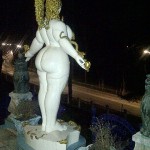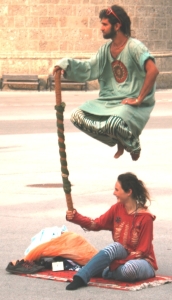NATURE, BUSINESS AND THE SACRED GIFT OF FEMALE INTUITION
The intuitive mind is a sacred gift and the rational mind is a faithful servant. We have created a society that honors the servant and has forgotten the gift. – Albert Einstein
“Women know. Maybe they can’t read or write, but they know. Believe me. They know,” Vandana Shiva declared to a captivated audience of 100+ people of all ages and backgrounds jam-packed in a small room on the first floor of an old building in Vienna’s Währinger Strasse Saturday night. “Ten miles,” she continued. “That’s the distance a woman is willing to walk for water before the alarm bells sound and she acts.”
My mind reeled. Ten miles in the US is like hiking from Times Square, NYC to Jersey City, NJ. In Austria, that’s like going from St. Stephan’s Cathedral to Klosterneuburg. Now I will be the first to admit that if Stuart Freeman announced on the FM4 morning show that Mama Dip was firing up her down home southern cooking in Klosteneuburg, you best get outa my way, cause I will be bypassing dachshunds and Nordic walkers to scoot my hungry little self up the Danube faster than you can say with collard greens and slaw on the side. But if I were required to make that hike every day to fetch a life essential item like water, I’m sure my arms would start to resemble Donkey Kong’s in length, my face Waldorf’s in grimace and my attitude Garfield’s in work ethic.
But that wasn’t the point. The point was, at 10 km the women recognized something was seriously off and were no longer willing to complacently go along. In the case of water, women in a small village of India were forced to walk 5 miles twice a day to fetch water because their wells had dried up. An international soft drink company had been drawing up hundreds of thousands of liters every day from boreholes and wells depleting the town’s ground water. The women protested and were eventually successful. The license to the company was no longer renewed.
According to Vandana Shiva, those women, like all women, intuitively know how to provide for their loved ones in the best way possible. In many of the rural villages of India, she said, perhaps the women cannot read or write, but they are rich in knowledge of the land. They can identify which seeds will grow best during a dry year and which during a wet one. They can tell when it will rain and which patch of earth can be used for which plants at which time to yield the best bounty. Only when the natural instincts are called into question or over-ruled by so-called “Smart Solutions” by “Smart International Companies” does the natural balance tip. Farmers become dependent on genetically engineered seeds that do not grow easily in the earth at hand. This forces them to, in turn, purchase pesticides and fertilizers that go on to destroy the natural organisms that would be doing the same jobs with the use of the traditional seeds. The farmers then plummet themselves into debt to pay for these “progressive,” “smart” solutions. They find themselves and their communities entangled in a sticky web of dependency on international corporations selling patented seeds and cancer-inducing poisons.
During Vandana Shiva’s talk, I experienced a lot of Ah-ha moments. I admit, even during my undergrad studies of international relations, I had never quite warmed up to economic measurements such as GDP as the basis of gauging a nation’s economic health but I could never quite pin down why. Vandana Shiva could. GDP is about money being spent and products being made from other products. Therefore a completely self-sufficient community that produces and consumes its own food, for example, where no money is exchanged, would appear “poor” accordingly to the traditional economic measurement tools. She argued that the world needs new indicators for economy that will not measure money flow but rather well-being. Again, and again, Vandana Shiva challenged the status quo and proposed alternatives. “Let us start measuring the health per acre of farms; instead of the wealth per acre. Let us decentralize and built local food sheds, similar to local water sheds in order to feed communities locally in much the same way we provide drinking water. Nature shrinks as capital grows but capital can never grow large enough to replenish nature.”
‘Yes,’ I thought. ‘We know. We can. We will.’
Ah, the bliss and exhilaration that lingers when you have one of those rare encounters with someone who thinks, questions, challenges and acts. There’s nothing quite like it. If only it weren’t so short-lived.
Less than 24 hours later, I found myself in my beloved Café Bräunerhof. What should have been a relaxing Sunday afternoon listening to some live classical music, sipping an espresso, reading a newspaper, and basking in the intellectually stimulated aftermath of Vandana Shiva’s talk, instantly went up in a “Are you out of your fracking mind?!”
In big bold letters spanning the front page of the Friday’s edition of the Times of London was an article entitled: “Women don’t understand Fracking.” In it, a Professor Averil MacDonald, who also declined to report how much the shale gas company pays her, criticized women in Britain for, according to her, not being smart enough to support shale gas exploration (apparently only 31.5% are in favor of it in the UK). Prof. MacDonald accused her fellow British sisters of being “concerned because they don’t want to be taking something on trust” and “acting on their instinct to protect children from threats.” And indeed, I would presume, they probably are guilty as charged. But I don’t agree with Professor MacDonald that it’s because they “haven’t had very much in the way of science education.” I would even venture that it is probably also not because the resulting freak earthquakes have endangered the precision of the steady white lines of their French manicures. No, I would say, that the highly intelligent, obviously intuitive British women were simply trusting their instincts. And rightly so. Something that Vandana Shiva would applaud and Prof. MacDonald would be well-advised to do in the future.
Follow up – May 2016 – the women are uniting in battle! You go girls!
Read more on the topic in the Guardian: http://www.theguardian.com/environment/2016/may/29/women-lead-the-call-to-arms-as-anti-fracking-fight-intensifies









